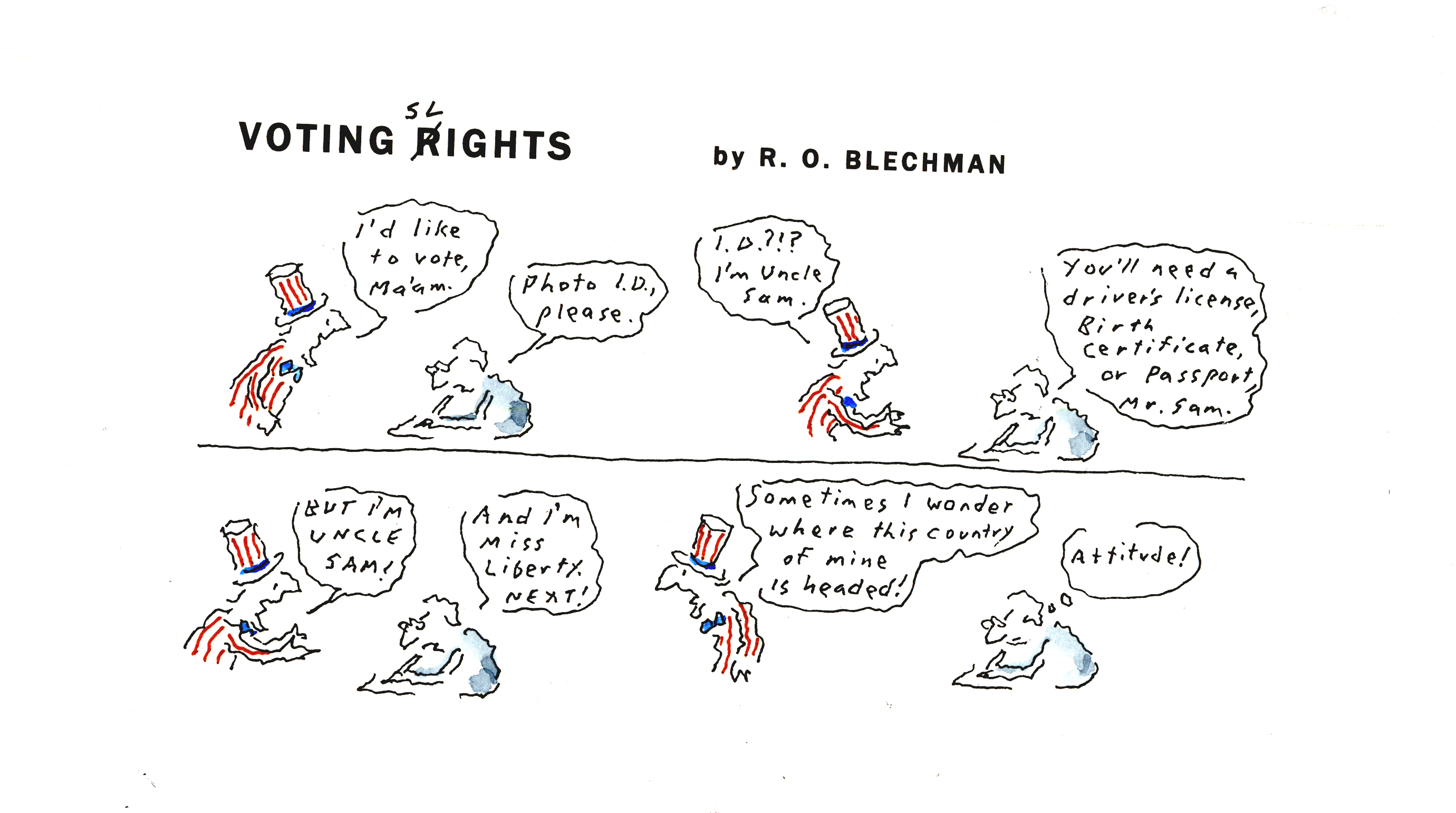Letters Letters
Doubt … More thoughtfulness in the world would make it such a better place. JoAnn Wypijewski’s “Woody, Dylan & Doubt” [March 10/17] is beautifully crafted—fair, compassionate, insightful. “The techno age meets the eleventh century” is a brilliant summary of the public’s involvement in an ongoing family tragedy. Kudos for an advanced twenty-first-century commentary. Jane Myers ann arbor, mich. There’s nothing radical or liberal about giving an accused sex abuser the benefit of the doubt outside of a courtroom. Most patriarchal societies now and throughout history have given the accused rapist/child molester the benefit of the doubt, without such benefit to the (always) less powerful accuser. Sad to see such a reactionary premise masquerading as liberal in The Nation. But too many so-called progressives enjoy Allen’s movies. pjwhite I began reading “Woody, Dylan & Doubt” goofily thinking it was about Woody Guthrie, Bob Dylan and metaphysical uncertainty. I was pleased as well as surprised by JoAnn Wypijewski’s intelligent, thoughtful and fair-minded piece on the latest innuendos concerning Woody Allen. David Lehman new york city Al From in Mississippi During the 1960s, I was a senior field representative for the Office of Economic Opportunity, the official War on Poverty agency—the only federal OEO employee to be stationed in Mississippi, my home state. I had planned with the legendary Jim Draper and several activists to seek employment with OEO so that the movement-related Child Development Group of Mississippi (CDGM) would have a friend in the bureaucracy. OEO was all too eager to employ a young, native, white Mississippian, a former Baptist preacher thrown out of his church for getting involved in civil rights activities. I was in a unique position to know firsthand from the inside the OEO strategy of maximum participation of the poor in controlling the programs and resources of the anti-poverty effort. Al From, who was assigned to the OEO Office of Inspection in Washington, stayed in my home in Jackson several times on his trips to Mississippi, and I have followed his career with great interest. In view of Rick Perlstein’s mostly deserved pillorying of Al for the reactionary role he has played in national Democratic Party politics in the years since the ’60s [“From & Friends,” March 3], I felt I should set the record straight about his participation in the poverty program struggles in Mississippi. Although the Economic Opportunity Act of 1964 required approval by the governor of a state before programs could be funded there, OEO found a loophole, by which programs could be funded through an institution of higher education. In the summer of 1965, the first Head Start programs were funded to local groups growing out of the civil rights movement by passing the grants through historically black colleges/universities (HBCUs): Mary Holmes College and Rust College. Subsequent struggles with the white power structure over who would control the incoming funds resulted in many of these groups continuing on a volunteer basis under the umbrella of the Friends of the Children of Mississippi until the control issue could be resolved. Senators “Big Jim” Eastland and John Stennis urged local white leaders to organize Community Action Programs, which the law required all funds to pass through. Where CAPs were not set up, CDGM and Friends of Children were funded through HBCUs to operate black-controlled programs. In counties where CAPs were set up, including Sunflower and Bolivar counties in the Delta, the movement-based groups were legally made subsidiaries to these power-structure-controlled CAPs. Neither Al From nor OEO could do or say anything about that legality. This was the setting for From’s claim that “Shriver sent me to Sunflower County to investigate a dispute between two Head Start programs, one run with federal funding by the white powers of the county—the Eastland forces—the other run on a volunteer basis by civil rights activists.” Those of us in the OEO committed to empowering local people held strategic discussions for keeping the resources and consequent political power of OEO funding in the hands of the black communities. Ultimate implementation of OEO strategy was up to the Atlanta OEO office, and Al From’s presence and participation were limited. But when he came to Mississippi representing the national office, he participated in those discussions and was on the side of the angels. His statement in his book that the fight was for “an important prize in the political balance of power in the county” was correct, as these were the first substantial institutional funds and jobs the black folks of these counties had ever controlled. In Sunflower and Bolivar counties, two Head Start programs were funded, one to the CAP and one to the local groups: Associated Communities of Sunflower County and Associated Communities of Bolivar County. By law, the funds had to flow through the CAP agencies, but in both cases OEO required that the local movement group be funded as a separate subcontractor of the CAP, with its own board, controlling structure and staff. Under the circumstances, this was the best possible outcome, and OEO relentlessly protected the independence of these groups until 1969, when Head Start funding was removed from OEO. I have no interest in defending Al From. While I was continuing to pursue every third- party and independent left initiative we could stir up over the years and working in community organizing and advocacy, Al was busy at a much higher level, doing perhaps irreparable harm to the political and economic plight of ordinary Americans by helping to restructure the party system so that no real Democratic alternative was on offer, leaving us—still—with a Clintonite-flavored administration somewhat to the right of Eisenhower Republicanism. But you could not ask for a more likable or collegial person to diminish the hopes of your grandchildren than Al From. For a short time, though, he played a positive role in empowering the black communities and children of Sunflower and Bolivar counties. Don Manning-Miller Vice president, Rust College holly springs, miss.
Mar 27, 2014 / Our Readers

What’s Really Behind the Koch Attacks on Democrats What’s Really Behind the Koch Attacks on Democrats
Hint: it’s not about healthcare.
Mar 27, 2014 / The Editors

Why ‘Harris v. Quinn’ Has Labor Very, Very Nervous Why ‘Harris v. Quinn’ Has Labor Very, Very Nervous
The fate of public sector unionism lies with a single Supreme Court justice—and not the one you’d want.
Mar 27, 2014 / Joel Rogers

Q&A With Edmund White Q&A With Edmund White
Edmund White, a member of the Stonewall generation, is the author of several award-winning memoirs and novels, including A Boy’s Own Story and City Boy. His new memoir is Inside a Pearl: My Years in Paris. This interview has been condensed and edited. Jon Wiener: A lot of what you’ve written celebrates “the golden age of promiscuity” in 1970s New York. That seems at odds with the gay marriage movement today. Edmund White: First, I was opposed to gay marriage because it seemed like one more way that gays were wanting to assimilate. When I realized the Christian right was so opposed to it, as well as tyrannical governments in Africa and Russia, I thought, “It must be a good thing to fight for.” Now I have a confession to make: I got married in November to my friend Michael Carroll, whom I’ve been with for nineteen years. At least we didn’t rush into it. When you arrived in France in 1983, was homosexuality a crime? No. Mitterrand had decriminalized it when he was elected in 1981. It was extraordinary. Suddenly the police were no longer allowed to raid gay bars or pick up gay people having sex in the park. Homosexuality in France has an interesting legal history. It was decriminalized by the French Revolution. Everything was fine until the Vichy government, which was in cahoots with the Nazis; they passed laws targeting homosexuals. It wasn’t until the Socialists won in 1981 that things changed again. When you left the United States in 1983, you were a famous gay writer. What did the French think about gay fiction? America thrives on identity politics, left and right. But France is opposed to the idea. Since the Revolution, the French have enthroned the idea of universalism. All of us must be equal before the law as abstract individuals, and that extends to the arts. Nobody in France would ever say “He’s a Jewish novelist” or “She’s a black novelist,” even though people do write about those subjects. It would look absurd to a French person to go into a bookstore and see a “Gay Studies” section. Even today. Michel Foucault died of AIDS in 1984—what had his understanding of AIDS been? I’d told him about it in 1981 when I was visiting, and he laughed at me and said, “This is some new piece of American Puritanism. You’ve dreamed up a disease that punishes only gays and blacks? Why don’t you throw in child molesters too?” The doctors were afraid to give him a diagnosis because he had written The Birth of the Clinic and other books that were critical of the medical profession. Was there a test for the AIDS virus in 1984? Not until ‘85. We didn’t even understand the viral nature of the disease. I found out in 1985 that I was positive, and I assumed I would be dead in two years. But I was what they called a “slow progresser.” Did your positive diagnosis galvanize you into writing more? That’s when you launched your gigantic Genet biography project. That was a kind of talismanic, magical, irrational act. I knew it would take years and years to complete, and it did in fact take seven years to write. If I had only two years left, I would never finish it. How did the Genet project go over with your friends back in New York? Larry Kramer, a wonderful fighter for gay people, felt that I was letting down my side by writing about something so far-fetched. But I didn’t just want to write about AIDS. I thought gays had been medicalized for a hundred years before Stonewall, and now we were in danger of being re-medicalized. Please support our journalism. Get a digital subscription for just $9.50! How is your health today? I had a stroke last year. This book I wrote mostly in the hospital. I couldn’t walk or talk, but I could still scribble. The French named you a Commander of the French Order of Arts and Letters—congratulations! Thank you. It’s a rank I share with Sylvester Stallone. Read Next: Stuart Klawans on How to Survive a Plague, the documentary on ACT UP and the early years of the AIDS epidemic
Mar 27, 2014 / Jon Wiener

Snapshot Snapshot
A public arts project in Baltimore called Wall Hunters has united an international group of street artists in calling attention to slumlords’ derelict properties. QR codes beneath murals bring viewers to slumlordwatch.wordpress.com, a site that identifies the owner of the property and provides contact information.
Mar 27, 2014 / Lunar New Year

LA City Council Tells Big Oil To Frack Off LA City Council Tells Big Oil To Frack Off
As residents complain of nosebleeds and headaches, the country’s biggest oil-producing city moves to ban hydraulic fracturing.
Mar 27, 2014 / Simon Davis-Cohen

Comix Nation Comix Nation
Mar 27, 2014 / R.O. Blechman

Germany Sends an Envoy to Russia Germany Sends an Envoy to Russia
Not the one you'd think.
Mar 27, 2014 / Bob Dreyfuss

3 Ways Public Transportation Makes Life Better for Pretty Much Everyone 3 Ways Public Transportation Makes Life Better for Pretty Much Everyone
Every $1 billion invested in the U.S. transportation infrastructure supports and creates some 47,500 jobs.
Mar 27, 2014 / Katrina vanden Heuvel

